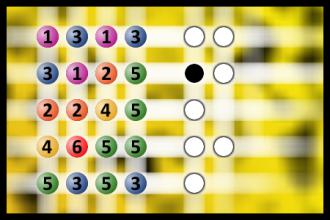Which is a winning combination of digits?
The computer chose a secret code (sequence of 4 digits from 1 to 6). Your goal is to find that code. Black circles indicate the number of hits on the right spot. White circles indicate the number of hits on the wrong spot.Correct answers: 68
The first user who solved this task is James Lillard.
#brainteasers #mastermind

Bert always wanted a pair of a...
Bert always wanted a pair of authentic cowboy boots, so, seeing some on sale, he bought a pair and wore them home.
Walking proudly, he sauntered in to the kitchen and said to his wife, Margaret, "Notice anything different about me?"
Margaret looked him over, "Nope."
Frustrated, Bert stormed off in to the bedroom, undressed and walked back in to the kitchen completely naked except for the boots.
Again he asked Margaret, a little louder this time, "Notice anything different NOW?"
Margaret looked up and said in her best deadpan, "Bert. What's different? It's hanging down today, it was hanging down yesterday, and it will be hanging down again tomorrow."
Furious, Bert yelled, "And do you know why it's hanging down?"
"Nope. Not a clue," she replied.
"It's hanging down, because it's looking at my new boots!"
And without missing a beat Margaret replied, "Shoulda bought a new hat, Bert."
Walking proudly, he sauntered in to the kitchen and said to his wife, Margaret, "Notice anything different about me?"
Margaret looked him over, "Nope."
Frustrated, Bert stormed off in to the bedroom, undressed and walked back in to the kitchen completely naked except for the boots.
Again he asked Margaret, a little louder this time, "Notice anything different NOW?"
Margaret looked up and said in her best deadpan, "Bert. What's different? It's hanging down today, it was hanging down yesterday, and it will be hanging down again tomorrow."
Furious, Bert yelled, "And do you know why it's hanging down?"
"Nope. Not a clue," she replied.
"It's hanging down, because it's looking at my new boots!"
And without missing a beat Margaret replied, "Shoulda bought a new hat, Bert."

